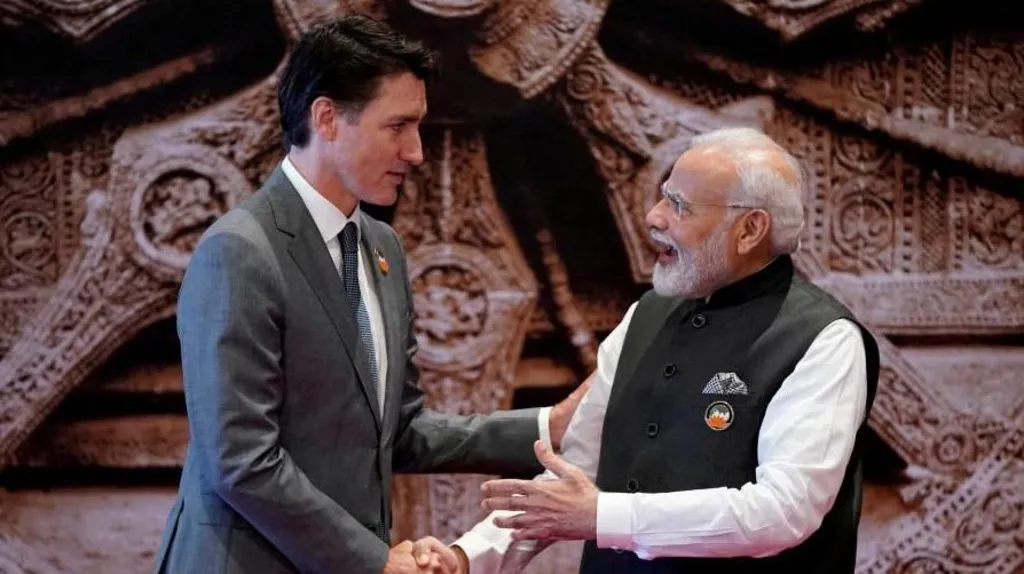The Impact of India-Canada Tensions on Trade and Immigration
4 min read
Both countries expelled their top diplomats on Monday

Both countries expelled their top diplomats on Monday
The diplomatic relationship between India and Canada has reached a critical low following a shocking accusation from Canadian officials that they believe agents of the Indian government were involved in a murder and extortion campaign on Canadian soil. This diplomatic rift raises pressing questions about how the fallout could affect the extensive trade and immigration ties between the two nations.
Bilateral trade between India and Canada amounts to billions of dollars, and Canada is home to nearly 1.7 million individuals of Indian descent. The deterioration of relations is unprecedented, and experts suggest that the future trajectory of these ties will depend on how both countries manage the situation moving forward. So far, neither country has imposed tariffs or other economic retaliations, but analysts warn that this could change if relations continue to cool.
“The most significant challenge for businesses and citizens is going to be uncertainty,” said Arif Lalani, a senior advisor at StrategyCorp and a former Canadian diplomat. The uncertainty surrounding trade negotiations and diplomatic relations could prompt businesses to seek opportunities in alternative markets.
For over a decade, Canada and India have intermittently negotiated a bilateral trade agreement. However, talks were paused last year, shortly before Canadian Prime Minister Justin Trudeau publicly accused India of being linked to the murder of Hardeep Singh Nijjar, a Sikh separatist shot in Surrey, British Columbia, in June 2023. Following Trudeau’s allegations, India briefly suspended visas for Canadian citizens, although processing resumed in November.
Despite these tensions, trade ties have largely remained intact, with bilateral trade valued at approximately $8 billion (£6.15 billion), according to India’s trade ministry. Canada’s trade minister has reassured business owners that the government does not intend to disrupt commercial relationships with India. However, ongoing uncertainty could lead businesspeople from both nations to reconsider their plans for expansion.
“People will think twice about expanding trade or building on existing relationships,” Lalani noted, emphasizing the potential for businesses to explore opportunities elsewhere.
Another significant concern revolves around the movement of people between the two countries. Since 2018, India has been the top source of international students in Canada, and approximately 4% of Canada’s population is of Indian origin. Karan Thukral, a lawyer based in Delhi, highlighted the profound human connection between the two nations, noting that many of his clients are eager to relocate to Canada but are now anxious about how diplomatic tensions might affect their plans.
While immigration processing remains operational, Thukral has advised clients to prepare for possible delays due to the reduction of diplomatic staff in both countries. Additionally, those in Canada with family in India are concerned about the potential reimposition of visa restrictions for Canadian nationals.
Such restrictions could have broader implications for trade, tourism, and investment, according to Jeff Nankivell, president of the Asia Pacific Foundation of Canada. He pointed out that the Indian government has previously shown a willingness to suspend visa issuance, suggesting that this could happen again. The impact would likely be felt most acutely within Canada’s large Indian diaspora community.
Nankivell also speculated that the diplomatic situation would continue to evolve, with the fallout lingering as Canadian authorities pursue legal action against individuals allegedly involved in Nijjar’s murder and related criminal activities. “That’s going to continue to raise the temperature,” he remarked.
In connection with Nijjar’s murder, four Indian nationals in their 20s have been arrested and charged, though their ties to the Indian government remain unclear. A trial date for these individuals has not yet been set. Canadian police reported that there are “multiple ongoing investigations” into the alleged involvement of Indian government agents in serious criminal activities within Canada.
On Wednesday, Trudeau reaffirmed his accusations against India, sharply criticizing Delhi’s alleged interference in Canada’s sovereignty. However, he also stressed the importance of maintaining economic and social ties with India. “We don’t want to be in this situation of picking a fight with a significant trading partner, with whom we have deep people-to-people ties,” he stated.
In response, India reacted strongly, labeling Trudeau’s approach as “cavalier” and accusing Canada of failing to provide evidence to support its claims. India has asserted that it “reserves the right to take further steps” in its response, while Canada’s foreign minister, Mélanie Joly, has indicated that all options, including sanctions, are on the table.
As the diplomatic situation continues to unfold, the ramifications for trade and immigration between India and Canada will remain a critical area of concern for both nations.